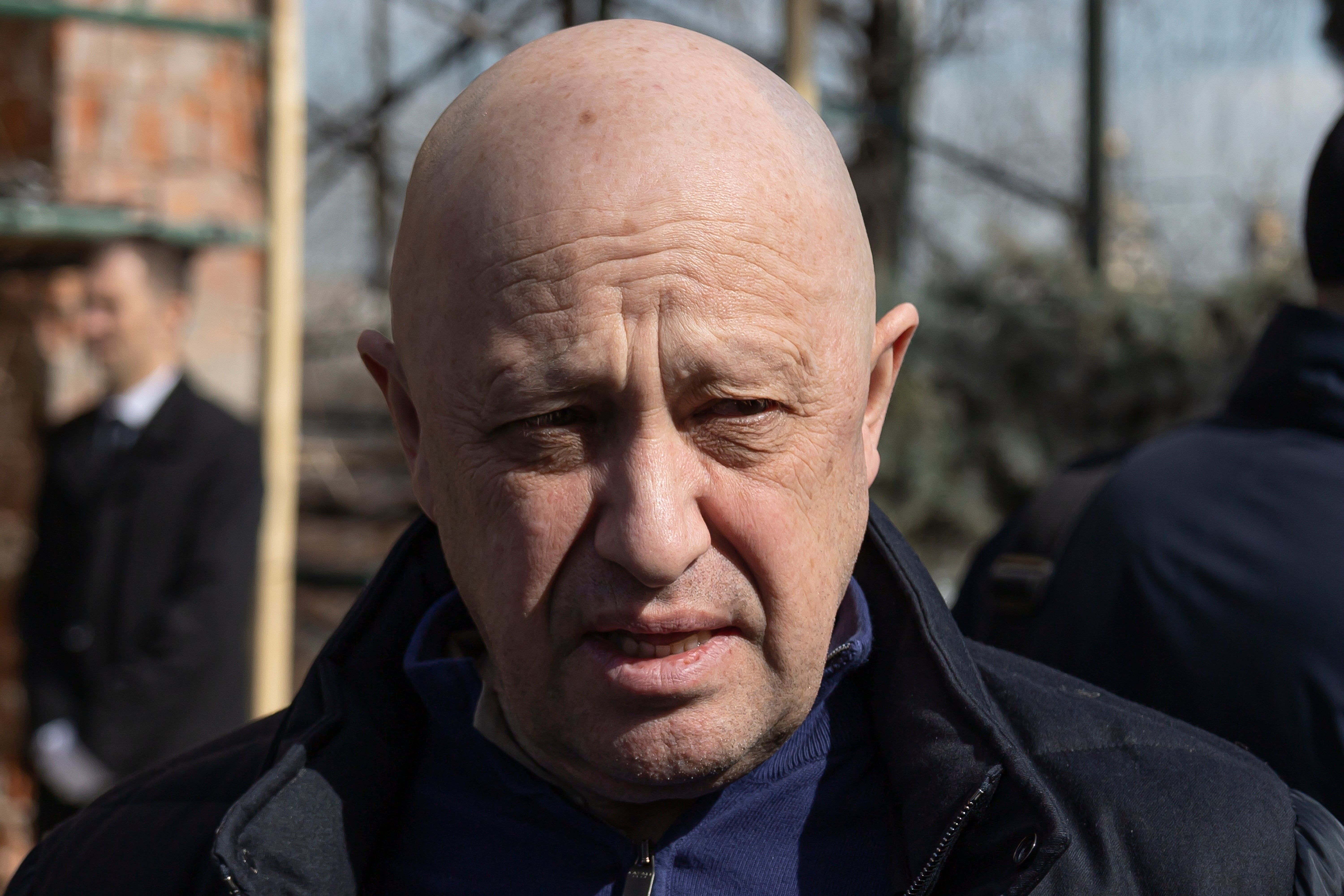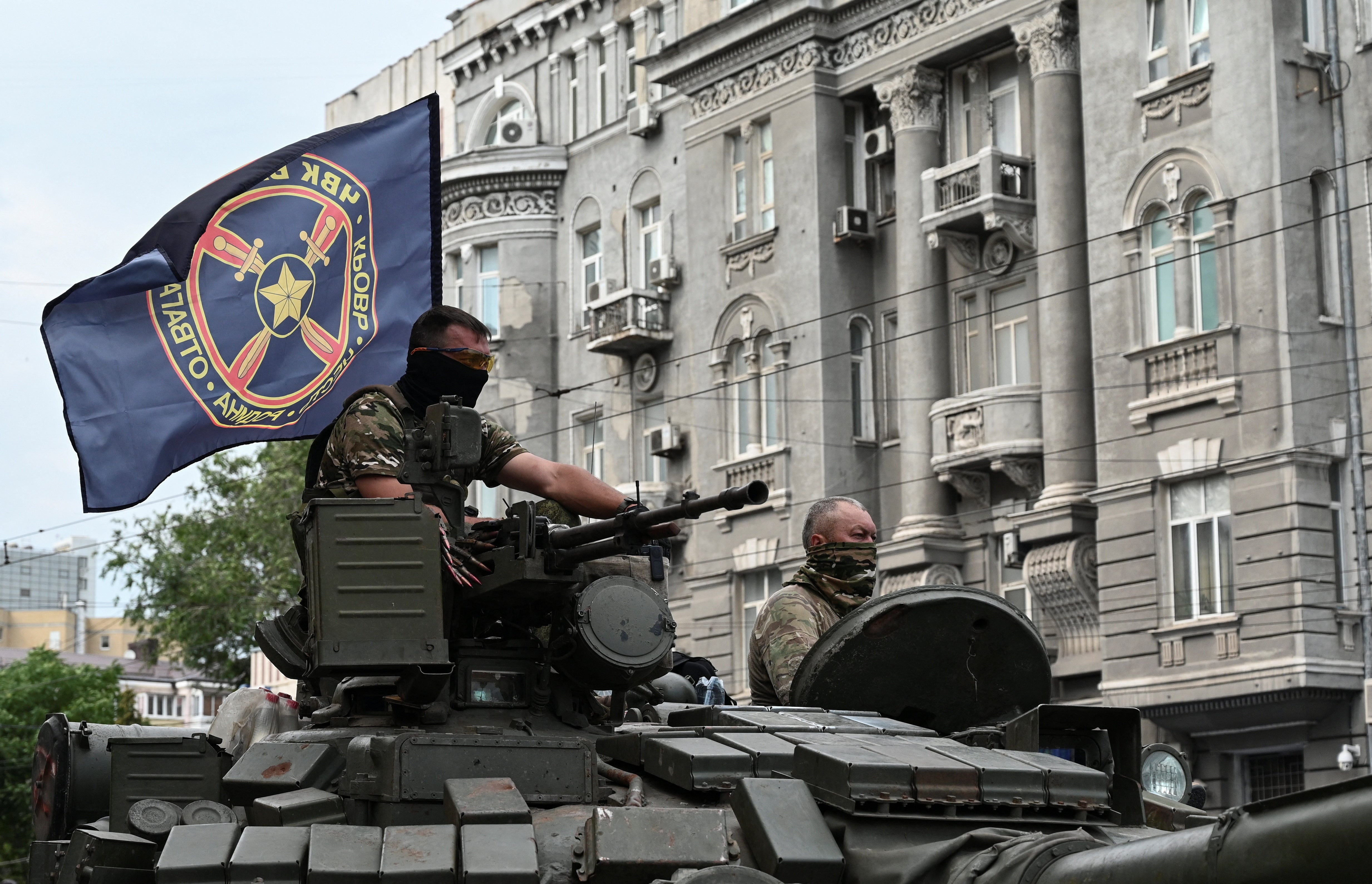24 hours of mutiny, mayhem and panic on the streets of Moscow
Mayor of capital warns residents to stay indoors as rebel mercenary force closed in on city – before Wager Group chief calls off advance ‘to avoid bloodshed’
Your support helps us to tell the story
From reproductive rights to climate change to Big Tech, The Independent is on the ground when the story is developing. Whether it's investigating the financials of Elon Musk's pro-Trump PAC or producing our latest documentary, 'The A Word', which shines a light on the American women fighting for reproductive rights, we know how important it is to parse out the facts from the messaging.
At such a critical moment in US history, we need reporters on the ground. Your donation allows us to keep sending journalists to speak to both sides of the story.
The Independent is trusted by Americans across the entire political spectrum. And unlike many other quality news outlets, we choose not to lock Americans out of our reporting and analysis with paywalls. We believe quality journalism should be available to everyone, paid for by those who can afford it.
Your support makes all the difference.Russia appears to have stepped back from the brink of a full-scale armed mutiny after the Wagner Group, one of the world’s most powerful private armies, halted a march on Moscow started by a vow for revenge.
While the immediate threat seems to have been averted, the unprecedented attack on the Russian military establishment marks the most serious challenge to President Vladimir Putin in the 23 years he has ruled with an iron fist – and the crisis is unlikely to just disappear just because the military convoy halted about 200km (125 miles) from the Russian capital.
Earlier in an extraordinary day, a visibly angry Mr Putin made an emergency address to the nation railing against the attempted coup and said the very existence of the Russian state was at stake.
"We are fighting for the lives and security of our people, for our sovereignty and independence,” he said, comparing the Wagner “mutiny” to the 1917 revolution that led to the collapse of imperial Russia.
The source of his ire was Yevgeny Prigozhin, the outspoken leader of the Wagner mercenary group, who had vowed to avenge attacks he claimed were perpetrated by the Russian military against his men in eastern Ukraine. Mr Prigozhin vehemently denied accusations of treason and spent the day vowing to fight “until the end”.
However, late on Saturday his band of mercenaries halted their march and would turn back “to avoid shedding Russian blood” – in a deal broken by Belarusian president and Russia’s closest ally Alexander Lukashenko.
“In a day, we marched to nearly 200km outside of Moscow. In this time, we did not spill a single drop of blood of our fighters,” Mr Prigozhin said in audio messages shared to his Telegram channels.
“Now, the moment has come when blood may spill. That’s why, understanding the responsibility of spilling Russian blood on one of the sides, we are turning back our convoys and going back to field camps according to the plan.”
It was unclear on Saturday night exactly what the agreement to halt the Wagner convoy entailed. But the Kremlin later confirmed that neither Mr Prigozhin nor his troops would face criminal charges over the insurrection – in a humiliating climbdown by Mr Putin who had earlier vowed revenge on those responsible. The Kremlin did not confirm Mr Prigozhin’s whereabouts but said he would be moved to Belarus, a close ally of Russia.
In a day of dramatic developments:
- Moscow’s mayor urged all residents to stay in their homes
- Authorities declared a “counterterrorist regime” in the capital – enhancing security and restricting some movement
- Crews dug up sections of highways to slow the movement of the Wagner convoy
- There was confusion over Mr Putin’s whereabouts, with the Kremlin denying he had left the city in a plane

There were also unconfirmed reports that a number of Russian officials had left the capital, with suggestions that Denis Manturov, a deputy prime minister, may have flown to Turkey.
The crisis ignited on Friday night when Mr Prigozhin, a former hotdog seller turned warlord, issued a string of expletive-riddled audio and video messages.
He accused the top Russian military brass of bombing his camp in the eastern region of Donbas, “lying” about the motivations for invading Ukraine, and rampant corruption.
As tensions mounted, Mr Putin responded by saying his former confidante was guilty of “armed insurrection” and “treason” and promised to punish those behind the “stab in the back”.
Wagner forces – deployed along some of the toughest battle lines in Ukraine – crossed back into Russia, captured the logistical hub of Rostov in the south, and then set off on a 1000km (620 miles) race to the capital.
Videos shared on their channels purportedly showed a column of tanks mounted on armoured cars and an advanced Pantsir anti-aircraft missile system making its way north accompanied by as many as 5000 men, or a fifth of Wagner’s claimed total forces.
Desperate to halt an advance, Russia's military fired on the column with helicopters, deployed tanks and even tore up key motorways with diggers according to videos posted online.

“We will destroy anyone who stands in our way,” Mr Prigozhin originally vowed. “We are moving forward and will go until the end,” he added.
The spectacular eruption of violence in Russia, came after searing tensions within the country’s top command since President Putin invaded Ukraine last February.
Mr Prigozhin, once a shadowy figure who denied his role with private military companies, has fast become the most outspoken and powerful figure in Mr Putin’s war.
His forces – which first appeared in Russia’s initial invasion of eastern Ukraine in 2014 – were stationed in some of the bloodiest battlefields like Bakhmut.
There he would frequently post videos criticising the Ministry of Defence and top Russian generals for poor battle plans or not providing enough ammunition. This claim, his former troops say, was a ruse to allow him to stockpile weapons he ultimately used in Russia on Saturday.
Speaking exclusively to The Independent, a former Wagner soldier, who was stationed near Bakhmut in November but managed to escape to Europe with the help of dissidents, said Mr Prigozhin was a “skilful manipulator”.

The soldier said he had gained so much power due to the war in Ukraine. “Everyone should understand and realise that the regular army and those who serve in Wagner now are under the rule imposed by Prigozhin.”
He said that Mr Prigozhin ruled by fear “in a dictatorial regime” and so people remain loyal to survive. “They are frightened [of] reprisal if they speak out or fail to follow orders,” he said, asking to remain anonymous for his own security.
He added that Mr Prigozhin’s “hysterical” statements and actions “were aimed at garnering support and creating the image of a strong leader”.
“Even to this day, some people continue to view him favourably,” he added.
In Ukraine, commanders, officials and foot soldiers watched with amusement, confusion and trepidation, at the events as they unfolded.
The extraordinary disintegration of Russia’s top brass signalled an unprecedented opportunity on the battlefield, but many on the ground feared what forces were supporting Mr Prigozhin and the dangers of a President Putin backed into the corner.
“If Prigozhin starts destroying aeroplanes and helicopters and makes it to Moscow, it means a big deal,” one Ukrainian intelligence source told The Independent.

“He can’t be doing this on his own, he must be supported by someone, some oligarch, someone who wants to remove Putin and put him in power. We don’t know who that is, and that is worrying,” the source added.
President Zelensky said that Saturday’s events showed the world “that the bosses of Russia do not control anything. Nothing at all”.
It’s “complete chaos”, he wrote on his Twitter account. “There is complete absence of any predictability,” he added urging the West to give more support to oust Russia from Ukrainian lands.
Ukrainian soldiers said Ukraine made modest gains on Saturday as the situation in Russia disintegrated. “Without a doubt, we will take advantage of this, as you will see in the near future,” Serhiy Cherevaty, spokesperson for the armed forces in the east, told The Independent.




Join our commenting forum
Join thought-provoking conversations, follow other Independent readers and see their replies
Comments